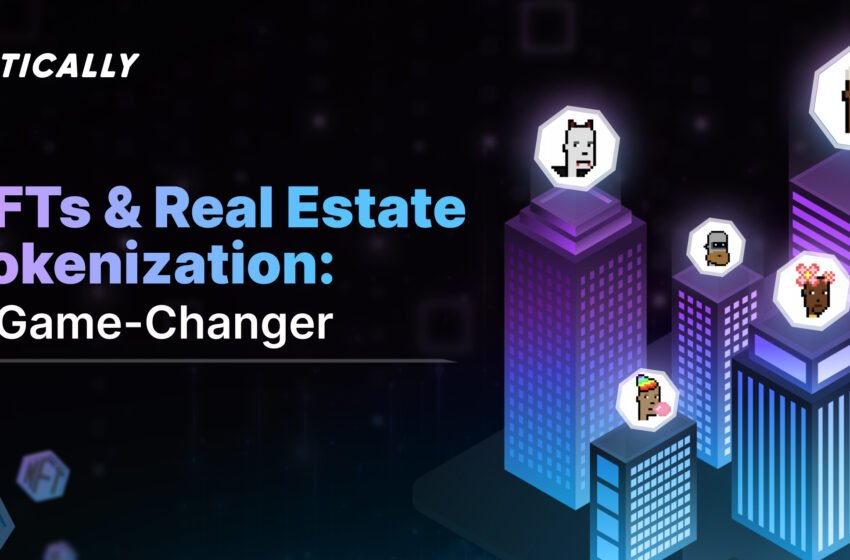US and Japan Regulators Discuss Crypto Oversight in High-Level Strategic
NFTs and Real Estate Tokenization: A Game-Changer
(Originally posted on : NFTICALLY )
Are you curious about the next major development in the world of non-fungible tokens (NFTs)? Well, it seems that real estate tokenization is poised to become the next big thing in NFTs.
Lately, the concept of tokenizing real estate assets has been making waves in the blockchain community, and for good reason. By tokenizing real estate, individuals can invest in property without having to buy the entire building or land outright. This approach allows investors to break down their investments into smaller, more manageable portions while still ensuring secure ownership.
Let’s dive deeper into the mechanics of real estate tokenization and explore how it could revolutionize real estate investment.
Understanding Real Estate Tokenization
For those interested in real estate investment or simply keeping an eye on industry trends, you may have encountered the term “tokenization.” In essence, tokenization involves converting tangible assets, like real estate properties, into smaller digital tokens. Each token represents a fraction of the original asset, and these tokens can be securely traded or sold on blockchain networks.
So, what does this mean for real estate? With blockchain technology and smart contracts, property owners can divide their assets into smaller, more accessible pieces for global investors. This process simplifies real estate investments that might otherwise be out of reach for many.
Smart contracts, those self-executing lines of code on the blockchain, are crucial here. They encode the terms and conditions of the fractionalized property, specifying who earns what portion of the profits and who holds specific rights to the property. Interestingly, non-fungible tokens (NFTs), often associated with art or collectibles, are also finding a role in real estate tokenization. ERC-721 tokens on the Ethereum blockchain are commonly used for this purpose.
How Does Real Estate Tokenization Operate?
Real estate tokenization is a groundbreaking concept that has captivated the real estate industry. It entails dividing a property into smaller fractions using blockchain-based smart contracts. This means that anyone who buys or owns a token possesses a share of the real estate and can claim a proportionate share of profits and losses.
For instance, imagine you own a property worth $100,000 but urgently need cash. In this scenario, you can tokenize your property by creating digital tokens representing it and offer these tokens for sale at affordable prices. Buyers can then invest in your property by purchasing as many tokens as they wish, securing a stake in your real estate.
Tokenization enhances transparency because it operates on a decentralized network. Every transaction is publicly recorded on the blockchain, ensuring complete openness. This approach can be applied to various property types, from commercial and residential to prestigious trophy assets. Even high-value commercial properties can be fractionated, opening doors for smaller investors while enabling property owners to quickly liquidate their assets.
Furthermore, tokenization is not restricted to property alone; it can extend to digitized shares of deeds, equity interests in legal entities, or ownership of collateralized debt. The advent of NFTs has expanded the possibilities for investors and property owners alike.
Advantages of Real Estate Tokenization
1. Transparent and Efficient Transactions:
The automated process cuts down the traditional paperwork, mitigating human intervention and the potential for unfair deals. Furthermore, transactions can occur unhindered by typical office hours, a convenience afforded by blockchain technology.
2. Enhanced Liquidity:
Tokenization addresses the traditional liquidity challenge in real estate by enabling fractional ownership units to be bought and sold digitally. This ease of access allows investors to enter the market more seamlessly, and property owners can swiftly sell their tokens, leading to an increase in market liquidity.
3. Opportunities for Small Investors:
By reducing the cost and entry barriers to real estate investment, investors are able to purchase small amounts of equity in multiple properties. This allows for portfolio diversification and minimized risk. Unlike traditional investment vehicles like REITs, tokenization offers transparency and control over investments.
4. A Free-Flowing Market:
Real estate tokenization fosters a decentralized financial system, providing equal opportunities to all stakeholders and eliminating biases and over-regulation. Fractional ownership simplifies decision-making, establishing a transparent and trustworthy market structure. Moreover, tokenization enhances accessibility, inviting individuals with limited resources to participate in the sector.
5. Reduced Counter-Party Risk:
Finally, tokenization significantly reduces counter-party risk. By streamlining transactions and minimizing the number of involved parties, counter-party risk is greatly reduced. Digital assets on blockchain platforms are easily bought and sold, and the enforcement of smart contracts ensures smooth, fraud-resistant transactions.
Challenges of Real Estate Tokenization
1. Smart Contract Security:
Despite blockchain being renowned for its security, the associated smart contracts may contain vulnerabilities that hackers can exploit. Such weaknesses could lead to significant breaches, potentially resulting in irrecoverable asset loss. Therefore, regular audits are non-negotiable to ensure the robustness of the system against such incidents.
2. Complex Licensing:
Complex Licensing represents another substantial obstacle in the path of implementing tokenized real estate assets. Acquiring the necessary licenses for security token offerings (STOs) can be a complex and daunting process. The intricate web of regulations and requirements often proves to be a hindrance to the smooth execution of tokenization in the real estate sector.
3. Regulatory Issues in Tokenization:
Regulatory Issues can also pose challenges in the advancement of real estate tokenization. There exists a considerable gap in understanding blockchain technology among many regulators and real estate professionals. This lack of knowledge often translates into regulatory ambiguity, which can inhibit the growth and widespread acceptance of this technology in real estate.
4. Tax Complexities:
Tax Complexities associated with cryptocurrencies add to the uncertainty for stakeholders. Global tax regimes have yet to establish clear regulations for cryptocurrency taxes. This regulatory ambiguity can instigate uncertainty among stakeholders, potentially discouraging their participation in real estate tokenization.
Conclusion
Real estate tokenization holds the potential to transform real estate investment and transactions. By reducing counter-party risk, establishing a transparent market, and enabling fractional ownership, it promises to make real estate more accessible than ever.
However, challenges such as smart contract security, licensing complexities, regulatory issues, and tax uncertainties must be addressed for tokenized real estate to thrive. If these obstacles can be overcome, tokenization may become an appealing option for investors worldwide.
Explore the benefits of NFTICALLY, a user-friendly platform to launch your NFT marketplace and list tokenized assets alongside non-fungible tokens. Visit the platform today and discover its advantages.








 Bitcoin
Bitcoin  Ethereum
Ethereum  Tether
Tether  XRP
XRP  USDC
USDC  Solana
Solana  TRON
TRON  Figure Heloc
Figure Heloc  Lido Staked Ether
Lido Staked Ether  Dogecoin
Dogecoin  WhiteBIT Coin
WhiteBIT Coin  Cardano
Cardano  USDS
USDS  Bitcoin Cash
Bitcoin Cash  LEO Token
LEO Token  Wrapped stETH
Wrapped stETH  Hyperliquid
Hyperliquid  Canton
Canton  Wrapped Bitcoin
Wrapped Bitcoin  Monero
Monero  Binance Bridged USDT (BNB Smart Chain)
Binance Bridged USDT (BNB Smart Chain)  Chainlink
Chainlink  Ethena USDe
Ethena USDe  Stellar
Stellar  USD1
USD1  Wrapped eETH
Wrapped eETH  Rain
Rain  Hedera
Hedera  sUSDS
sUSDS  Litecoin
Litecoin  PayPal USD
PayPal USD  Dai
Dai  Coinbase Wrapped BTC
Coinbase Wrapped BTC  Avalanche
Avalanche  Zcash
Zcash  Sui
Sui  WETH
WETH  Shiba Inu
Shiba Inu  Toncoin
Toncoin  Cronos
Cronos  USDT0
USDT0  World Liberty Financial
World Liberty Financial  Tether Gold
Tether Gold  Polkadot
Polkadot  PAX Gold
PAX Gold  MemeCore
MemeCore  Uniswap
Uniswap  Mantle
Mantle  Ethena Staked USDe
Ethena Staked USDe  BlackRock USD Institutional Digital Liquidity Fund
BlackRock USD Institutional Digital Liquidity Fund  Circle USYC
Circle USYC  Global Dollar
Global Dollar  Falcon USD
Falcon USD  Bittensor
Bittensor  Aster
Aster  Aave
Aave  Pi Network
Pi Network  OKB
OKB  Sky
Sky  Pepe
Pepe  syrupUSDC
syrupUSDC  Bitget Token
Bitget Token  Ripple USD
Ripple USD  HTX DAO
HTX DAO  NEAR Protocol
NEAR Protocol  Internet Computer
Internet Computer  Ethereum Classic
Ethereum Classic  BFUSD
BFUSD  Ondo
Ondo  Superstate Short Duration U.S. Government Securities Fund (USTB)
Superstate Short Duration U.S. Government Securities Fund (USTB)  POL (ex-MATIC)
POL (ex-MATIC)  Gate
Gate  Worldcoin
Worldcoin  KuCoin
KuCoin  Pump.fun
Pump.fun  Jupiter Perpetuals Liquidity Provider Token
Jupiter Perpetuals Liquidity Provider Token  Midnight
Midnight  Cosmos Hub
Cosmos Hub  Ethena
Ethena  Jito Staked SOL
Jito Staked SOL  NEXO
NEXO  USDtb
USDtb  Spiko EU T-Bills Money Market Fund
Spiko EU T-Bills Money Market Fund  Binance-Peg WETH
Binance-Peg WETH  Rocket Pool ETH
Rocket Pool ETH  Official Trump
Official Trump  Algorand
Algorand  Binance Bridged USDC (BNB Smart Chain)
Binance Bridged USDC (BNB Smart Chain)  USDD
USDD  OUSG
OUSG  Wrapped BNB
Wrapped BNB  Filecoin
Filecoin  Function FBTC
Function FBTC